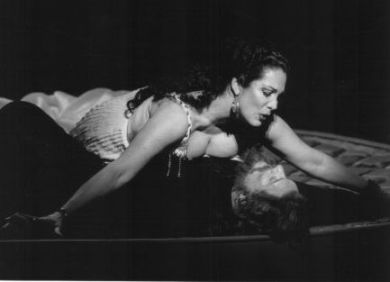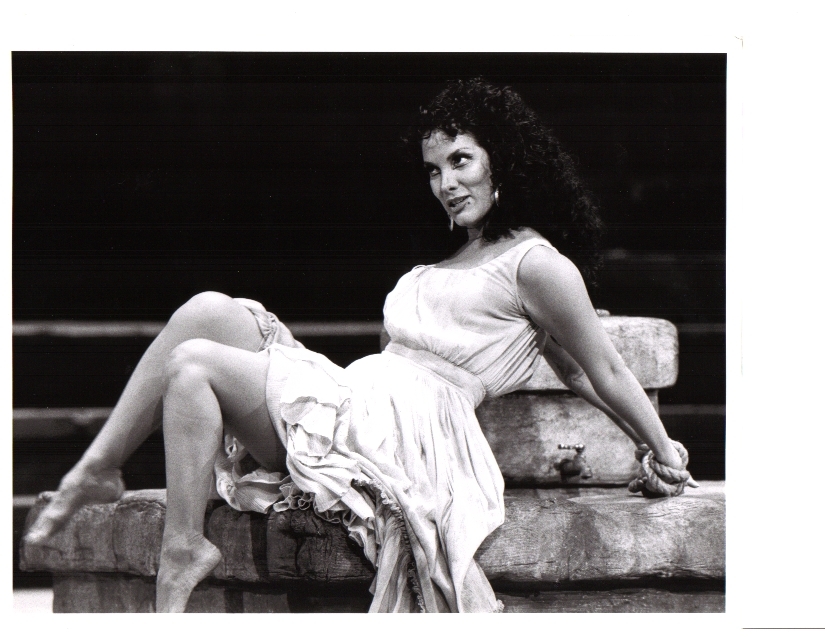Classical Singer, Vol 13 No.1, January 2000
How do I project sensuality on stage … and feel good about it?
In response to a recent letter, Adria Firestone, a mezzo specializing in the role of Carmen, detailed her in-depth approach to role study.
Dear Miss Firestone:
I have been having some difficulties with Carmen, for a few reasons. Roles like Rosina and Cherubino are lots of fun, and easy for me to relate to. But with Carmen, I have a few blocks. I come from a very conservative, traditional family and I have grown up with many of those traditions programmed into my head.
As a result, Carmen is a character I have trouble relating to. When I sing, I feel as if I am faking it completely. And the funny thing is, I don’t see Carmen in a bad light at all – I actually admire her! I admire her honesty, her independence, and the complete joy with which she lives each moment. But her sexuality and sensuality and her confidence in her body are aspects I don’t find in myself.
I was actually in the chorus of Carmen when you did it here a couple of years ago (it was my first opera!), and I remember thinking how much I admired and was in awe of your Carmen. I hope to feel like that about Carmen some day. How do you approach her character? Maybe it will help me to break through to my own version of Carmen. I appreciate any insight you might have for me!
Thank you so much, Priti Ghandi
Dear Priti: This may be a longer reply than you expected, but your inquiry comes at an opportune moment. I have been asked so many times and in so many interviews: Who is Carmen? How do you play a character like Carmen? Well, here goes, and keep in mind that this is highly subjective – it’s my way, not the way.
First, with any character I play, I must find some link with my own person. That link becomes the skeleton of the character upon which I put flesh and form. With Carmen, the link for me was her lust for freedom – the same freedom that burned at my core – freedom denied me by my parents. Like you, I was raised in a very strict home, in my case, Italian-Spanish. As an only child I was so suffocated and watched-over, that I literally escaped to the world of theater.
Carmen is the first liberated woman in opera. She is so honest and straightforward. Even in today’s world that kind of directness is keenly admired. So often – perhaps usually – we don’t say what we mean. Carmen always says what she means. She doesn’t care if she is liked or approved of by society. Her law is an internal one, her own code. She is inner-directed and therefore that much more powerful an archetype.
Her physical exuberance is simply a reflection, an extension, of her emotional self. She seems to me to be a natural dancer, much like I was as a child. I took tap, ballet, invented my own brand of flamenco, and always danced around the house. As an actress, that freedom of moment has helped my expressiveness immeasurably. Why not try a few classes in salsa to loosen the loins and hips? What about a few lessons in flamenco – great for your posture, no matter what role you are doing! And then there is yoga, my centerline for everything. All of these disciplines help make the body a very finely tuned and responsive instrument – absolutely necessary for any actress or singer. Strength and centering are a great foundation.
Speaking of the physical – where is Carmen’s center? Every character has a basic center in the body. For me, Carmen’s center is her loins – her deep connection to the living earth. A note must be added here. A character is a living creation, and like any living thing, capable of change and growth. The center of the character may change as your knowledge of the character deepens. Amneris, for example, has a terrible conflict between her heart and her head. This for me is expressed in her arms and the noble set of her head. This is the vital internal makeup that makes a role come alive.
It is also vital to the success of any character you play that you are honest with yourself about your assets and your liabilities. That may sound easy, but consider the magnitude of: “Know thyself.” There is no way I would consider doing Cherubino, although I can sing all the notes. There are at least 100 singers who can play him better. I must be able to relate to a role in some way, even though far-removed, like Prince Orlovsky or Madame Flora. As a young performer, experimenting with roles helps one learn just where one is comfortable or not, so this is not meant as a discouragement — only some future food for thought.
Perhaps a partial solution to your dilemma is to divest Carmen of the pseudo-sexuality that surrounds her, and work from the inside out. Carmen is not a sexual vamp, a prostitute or a nymphomaniac. Her sexuality is not found in hands-on-hips, lots of cleavage or legs akimbo. Carmen’s sex is in the proud tilt of her head, the directness of her gaze and the pecho or ‘chest,’ the area between the clavicles and the solar plexus, that she so boldly offers the world. This is the proud stance of the flamenco dancer, the gypsy. Not a Disney gypsy, but the real European gypsy: feral, fiercely proud, willing to do anything to protect their own and to survive. Carmen’s sexuality is in her brain; it’s in the way she thinks. Her sexiness is in her joie de vivre, her strength, her valiant spirit and the courage with which she lives the life she believes in – la vie errante. She walks the talk!
Carmen has her own laws and she leaves Jose for another man. Why? She has lost respect for a man who does not possess or respect himself. Another link for me – I cannot love a man I do not respect. Jose can’t handle her honesty – see Act III, “Chien e loup ne font pas longtemps bon menage” (Wolf and dog do not make lasting liaisons). Read all the dialogues, know every character’s lines. Read the Merimee novella, but keep only the trance and the milieu – remember, this is Bizet’s Carmen, and a Frenchmen’s view of Spain. Read Maya Angelou’s entire poem “Phenomenal Woman” – that’s Carmen.
It’s the fire in my eyes
And the flash of my teeth
The swing of my waist
And the joy in my feet.
I’m a woman
Phenomenal woman
That’s me.
Watch Carlos Saura’s film of Carmen; observe the posture and attitude of the dancers. I remember Saura telling me in rehearsal in Italy: “Cadera por el suelo (hips on the floor). Don’t point your toes. She’s a gypsy, not a trained dancer.”
Pay attention to the music and the key changes. It’s a masterpiece, and each time you look at it you will discover new delights and complexities. The quick 16th note repeated pattern at Carmen’s entrance – change the rhythm, slow it down, and what have you got? The death motif – even from her first entrance. Feel the inexorable, forward movement of the death march in the Card Aria. Notice Jose’s pleading, lyrical lines in Act IV, and Carmen’s resolute, terse replies. Ask yourself, “Why does she still have Jose’s ring?
Escamillio has enough money to buy 20 rings – why does she keep that ring?” It’s hard to don the guise of another, to experiment with a character, to risk exposing your dark side or your softness on stage. But only with that risk, that ‘‘pushing the envelope” does your art grow. You will discover that some roles will never suit you, others will fit like a glove.
Even as child the big archetypal characters felt natural to me. Only now do I have the depth of character and enough confidence to show my own vulnerability. Only now can I fill the shoes of the characters that inhabited my imagination so long ago.
Carmen is to be admired. A life force that big, that intense in 1875 had to be killed. Today, a life force like that, if tempered with compassion (a quality Carmen lacks) is to be appreciated and admired. It takes guts to live that truthfully, and that intensely in the moment.
I’m glad you enjoyed my Carmen – but, rest assured, you will find your own, unique gypsy inside of you. With all my heart I wish you a joyous journey of discovery to the treasure of an endlessly fascinating character. In the process, you will be on the most important path of all – the surprising journey to yourself. In transforming and refining ourselves, we are as ripples that touch and affect the world around us, person by person.
With sincere best wishes, Adria



